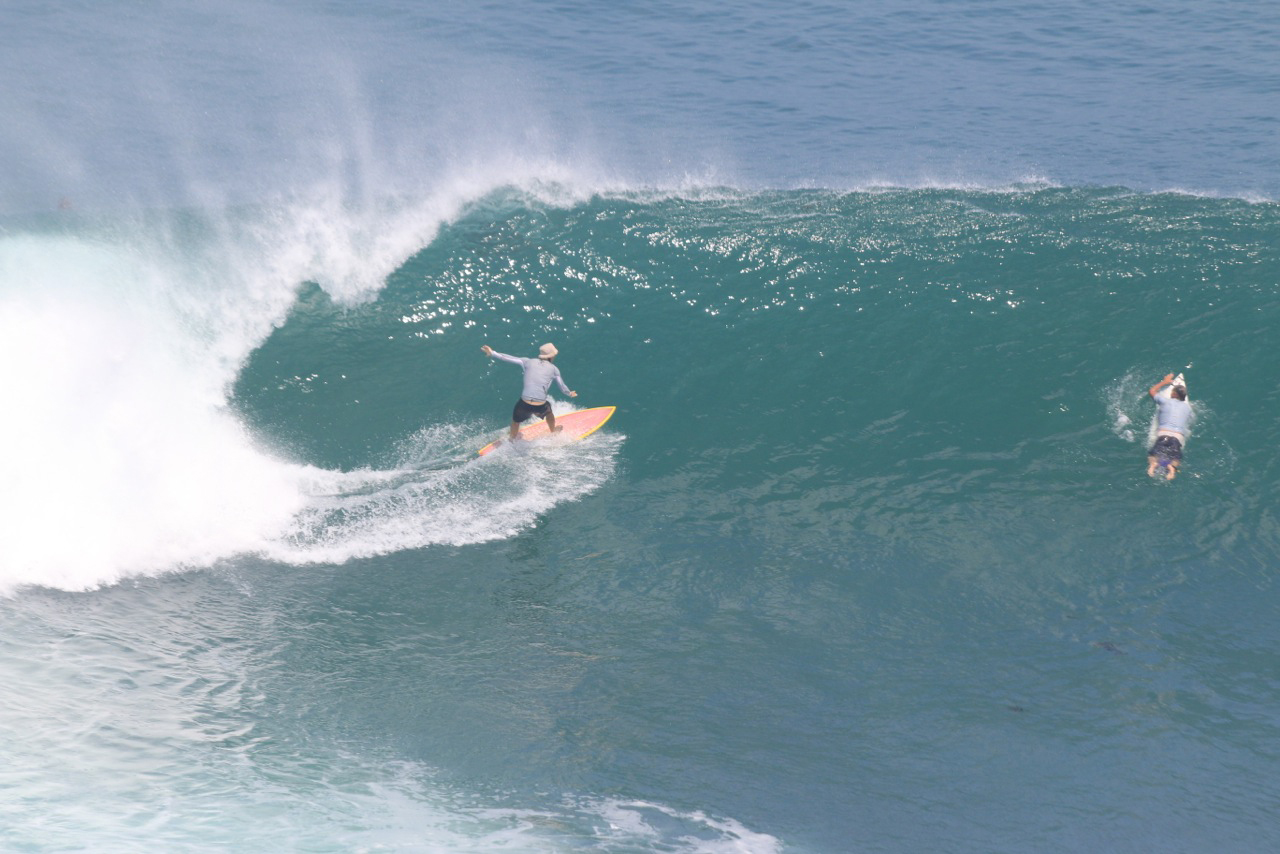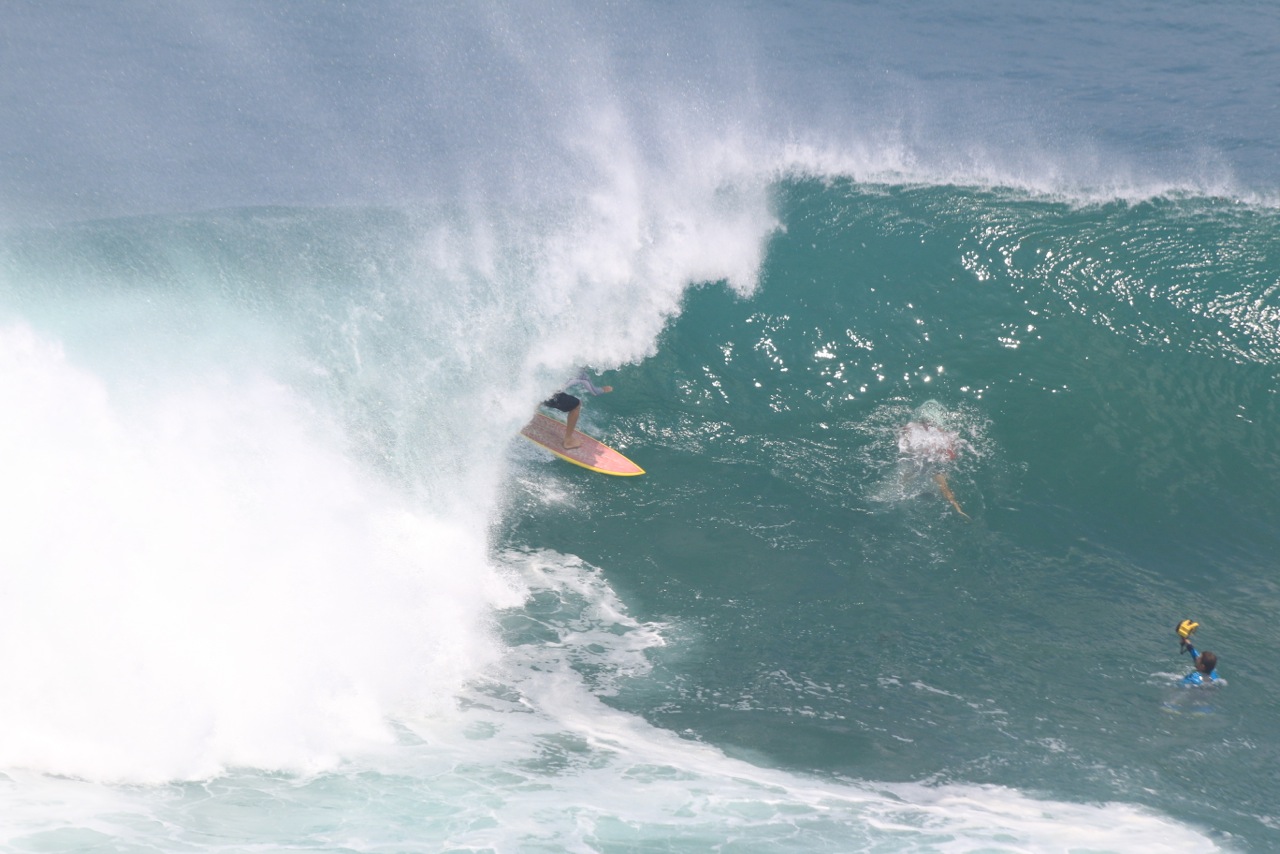The sun, the moon, the truth, and the surf: The amazing life of Patrick Burgess
The Germans and Russians and Scandinavians and Chinese and Israelis being led out through the channel to Old Man’s for another morning of surf lessons and carnage barely notice the ordinary-looking fellow with an engaging smile and thinning silver hair as he coasts past them on a dribble of a wave, his dawn patrol session concluding.
Had they been looking out at the break instead of watching their instructor demonstrate the Greg Noll survival stance, or choofing nervous cigarettes, they might have seen the former Sydney barrister and human rights advocate Patrick Burgess take off way outside, walk his longboard to the nose and hang ten through a long section, before cutting back and doing a headstand through the flats. The day before, when it was overhead, they may have seen him pig-dog an inside-out barrel on his Channel Islands five-eleven.
It doesn’t matter a damn to Burgess. Every day he rides a wave is a good one. The beach breaks and clumps of reef along Bali’s Canggu coast are home to plenty of quirky and fascinating characters, many of them with back stories that are even more interesting than the individuality they bring to their surfing. Floating around out the back at Old Man’s or Tugu Lefts or the Rivermouth, I’ve met saints and sinners, criminals, creeps and creatives. I’ve never met anyone like Patrick Burgess.
Burgess and I had been circling each other for years, without actually meeting. I knew his legendary dad, the Vietnam war correspondent and knockabout (media code for really likes a drink) journo Pat Burgess from my tyro days as a journalist in Sydney when the late Ron Saw opened doors (most of them batwing) for me and introduced me to my heroes, but Pat Jr, who has lived in Bali for a decade, was one of those guys everyone says you must know, but I didn’t. Until last year, when he came to my aid in helping slake writer William Finnegan’s insatiable thirst for surf by dropping him into some double-overhead pits on the Bukit.

Patrick Burgess sets up a Padang Padang barrel as William Finnegan paddles over the shoulder
It turned out that while we hadn’t met, I had judged him rather harshly in a heat of the Deus Nine Feet and Single longboard contest the previous year. I remembered watching this tall, thin goofy surf rather stylishly through a couple of sections before failing to compete a spinner in the shorebreak and almost decapitating himself. “Who the fuck is that?” I asked fellow judge Steve Montell.
“Oh, that’s Patrick,” said Monty. “He’s actually a very interesting guy.”
Burgess, now 60, grew up in Manly and Queenscliff, where his first memory of surfing is body-bashing on the back of his famous and beefy dad, squealing with delight as he swallowed salt water. He graduated through Coolites to the Manly Boardriders, then captained the University of NSW surf team in their glory years when they would regularly beat Sydney University, captained by Derek Hynd. As a teenager he also fell in love with the guitar, and led garage and cover bands that played the beaches and occasionally the big smoke over the water.

...mission accomplished
From his earliest student days, Patrick was a surf chaser and an inveterate adventure traveller. He paddled a dug-out canoe and pushbiked through Central Africa back when you could, volunteered at the Mother Teresa Hospice in Calcutta, hitch-hiked across America, sailed the Pacific and took a canoe from Nias to the Hinakos and surfed a macker swell alone at Asu. He also resisted the impulse to follow his father’s footsteps into the media and instead became a highly-respected barrister with chambers across the road from the Downing Centre criminal courts.
One day in 1994 he watched news footage of the Rwandan Genocide and realised with horror that these decimated places were the villages where he and a girlfriend had been taken into homes and looked after as travellers while on their cross-Africa bike ride. He knew these people. He had to help.
Within a week he had handed over his legal cases to partners and was starting work in a refugee camp in Africa, in charge of 500 men who were racing against the clock to build a tent hospital over a swamp to slow the death rate of children. Three weeks later CARE Australia made him head of the whole project, including doctors, nurses and 1700 Rwandan staff. He recalls: “Our program was to take care of children whose parents had been hacked to death. We soon had 600 kids, then 800, then 1400. We were losing 15 kids a day until we got the food and medical treatment under control.”
Flying between his Sydney chambers (where his backpack and work boots were always in a corner, ready for use) and the disaster zones of Africa over the next few years, Burgess rose to the top of the field of emergency crisis management. The job was fraught with danger. One night his staff quarters in a refugee camp were attacked by Zaire militia and a dozen of his workers killed, with more than 500 refugees shot. Burgess escaped, leading an evacuation of all the aid agencies through the mountains to the safety of a UN compound.
When the Suharto regime fell in 1998 and Indonesia was plunged into a volatile financial crisis, Burgess was seconded by Community Aid Abroad (now Oxfam Australia) to help combat the food shortage crisis in West Timor. There he met and fell in love with a beautiful young Indonesian woman named Galuh Wandita, who was trying to help East Timorese women who had been victims of mass human rights violations, including rape and torture by Indonesian soldiers. Together they moved to Timor Leste, where Galuh became one of the most respected advocates for women’s rights and Patrick eventually ran the UN’s human rights program.
Life in Timor was full of hardships and constant dangers, but it had its lighter moments. Burgess kept at least one surfboard with him wherever he was posted, and when Timor had its first proper swell in years, he was on hand to tuck into a three-foot barrel, captured on the front page of the local paper under the headline: “Is Timor the new Bali?”
It wasn’t, and Burgess flew to Bali for short breaks whenever he could, keeping a few boards at Uluwatu. Once he even managed to catch a big swell there during a four-hour flight stop.
About 10 years ago, now with two small children’s safety to consider, Patrick and Galuh left Timor for Bali, where they set up a human rights training centre at Canggu under the banner of their organisation Asian Justice and Rights (AJAR), where they work to alleviate many forms of injustice across Asia. With this as their base, they travel across Asia and the world fighting human rights injustices.
In this role Patrick found himself at a social justice conference in Myanmar on a panel with Aung San Suu Kyi, the social democrat hero (and now leader) of Burma. Suu Kyi suggested that he should develop a television soap opera that explained human rights to Burmese. Burgess was a surfer, barrister, musician and crisis manager, but thus far not a television producer, but he agreed to take a look at it.
Back in Bali he teamed up with AFI-winning scriptwriter Phil Gwynne (Australian Rules) and the two thrashed out scripts for an eight-episode “edu-tainment” drama series that would explain basic human rights to TV-mad Burmese. They called their soap opera The Sun, The Moon and The Truth, after the wonderful words of the Buddha, that there are three things that cannot be long hidden.
The show has been a smash hit in Myanmar, with more than five million viewing the first series and a second now in production. A similar program has just been commissioned for Timor Leste, with funding from the European Union.
Patrick Burgess is on a roll, but to be honest, he’s more interested in the next serious swell and how the hell he’s going to find time to promote his new album of original songs. And he’s the only surfer/songwriter I know who can move seamlessly from a song about Tsunami Dave riding a wave over police cars to one about 9/11 or the Rwandan Genocide. No matter what he’s seen and done, surfing has always been part of his greater sensibility.
He says: “From Rwandan days I’ve been in situations where I’ve feared for my life. I’ve got memories I wish I didn’t have, but now, living in Bali and flying in and out of trouble spots, I’ll come home exhausted, but try to get in the surf immediately. Two hours in the ocean is better than anything for restoring the spirit, for healing the scars.”
Patrick Burgess will present an evening of his original songs at the Noosa Festival of Surfing on Tuesday, March 8.


Comments
Wow what a fascinating bloke. Two types of people in this world, consumers and contributers, Patrick Burgess is the latter.
Great piece Phil and I love the fact that SN chooses to showcase these articles.
PS Is that the same William Finnegan who grew whiskers on his chin-again and the wind came along and blew them in-again?
(Sorry, couldn't resist)
what an amazing man you are Patrick. thank you for all that you bring to humanity.
always beautifully written Phil...
A very down to earth guy with no airs or graces. What a life and storey to tell.
Sounds like a legend, a myth from times gone by. Good luck to him.
By chance, I'm just about to finish William Finnegan's long book on his surf travels. Most engaging.
By the way Phil - decimate - to reduce by one tenth, kill a tenth of the population.
Yeah, I know, everyone is using it these days in indicate 'annihilate', or 'devastate', and some shonky dictionaries on the web will give you that meaning, but it ain't.
Sorry, my current bugbear! Even Nassim Nicholas Taleb used it incorrectly,
and he's the smartest guy on the planet, so you're in good company. :-)
Thanks Pat Burgess for making the world a better place and an intriguing cat.
Thanks Phil Jarratt for the words highlighting these facts.
Thanks Swellnet for separating yourselves from the pack and having such interesting content.
Thanks Batfink for making some of us look quite dumb- me included:)
The word legend is bantered around a little to often but this guy is just that.
Phill I believe your words re (hero)Burma leader are not correct,Generally speaking the leader of a government as I understand is a President or Prime Minister elected by a particular political party. As the current President of the Burmese Government does not step down till 31 March,that is when a new government can be formed.She cannot not be the president but say's she will lead by proxy. just sayin
Not very often I feel compelled to compliment Swellnet on a good article (don't take that the wrong way SN) but that was a great article.
Question for Batfink. Is a person with only 10 teeth decadent?
Quite possibly chin! :-)
But not certainly.
Great article on a truly inspirational man. Talk about giving back to a community. Bloody Aussie Legend doing us proud. Respect !!!